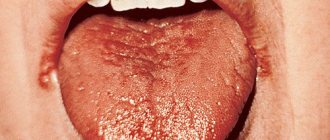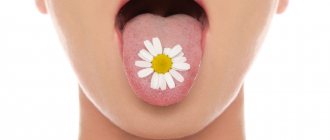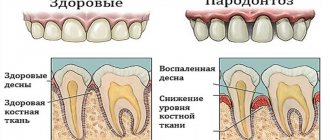Causes of bitterness in the mouth
Patients who complain of an unpleasant taste note the appearance of bitterness in the morning, almost immediately after waking up. A person feels sick and a pronounced bitterness in the mouth makes it impossible to enjoy life. What is the reason? Let's consider a list of non-medical reasons for the appearance of a bitter taste.
Common causes of bitter taste
Night smoking. Not eating after smoking leads to retention of nicotine on the tongue, which gives a person a foreign taste in the morning. Feast. Drinking alcohol in excess of the norm stimulates the active release of bile. The habit of eating at night. Digesting spicy and fatty foods requires the production of a significant amount of bile. Medicinal factor. Taking certain medications (antifungals, corticosteroids, antihistamines) temporarily disrupts the natural functioning of the receptors. Injury. A tongue bite or burn often triggers a condition where a bitter taste appears.
Elimination of traumatic factors leads to the disappearance of the unpleasant symptom, but if even after correction of behavior and lifestyle the bitterness in the mouth remains, then it is necessary to consider the possibility of the presence of a disease.
Diseases that stimulate the appearance of bitter taste
cholelithiasis; diseases of the gallbladder and its ducts; cholecystitis; facial paralysis; allergy.
Sometimes two unpleasant symptoms are combined at once - bitterness in the mouth and severe nausea, the causes of which may be hidden in the presence of intolerance to certain foods (most often diagnosed during pregnancy).
A white coating on the tongue and the presence of a bitter taste increase the risk of stomach problems.
This problem is well described in the video below.
Prevention
To minimize the risk of such symptoms, you need to follow several rules:
- completely give up bad habits;
- follow recommendations regarding gentle nutrition;
- enrich the diet with vitamin complexes and nutrients;
- observe the rules of oral hygiene;
- timely elimination of diseases that caused bitterness in the mouth and nausea;
- undergoing preventive examinations with a gastroenterologist and dentist several times a year;
- have a full rest.
The prognosis of bitterness in the mouth and nausea directly depends on conscientious adherence to the above recommendations. When they are completed, the symptoms will no longer bother the person, and failure to comply with at least one point will cause frequent and intense attacks.
Bitterness in the mouth and nausea appear as a result of the reflux of bile into the esophageal tube. Often these symptoms occur after waking up or eating. They appear due to many factors.
The cause of the bitter taste in the mouth and nausea can be assumed by additional symptoms, for example, dryness of the oral mucosa, vomiting, coating on the tongue, and fever. Constant bitterness in the mouth is a sign of dysfunction of the liver, stomach, gallbladder or intestines.
Causes of thirst and dry mouth
Lack of sufficient moisture in the body is the key reason for dry mouth mucous membranes and the appearance of a feeling of thirst. However, there are other initiating factors that lead to impaired hydration of the oral cavity.
General factors
over-salted food. The appearance of a feeling of thirst when eating salted fish and fatty meat foods is considered a natural reaction of the body. Thirst also appears after heavy consumption of sugary sweets. habit of drinking tea and coffee. Drinks often lead to dehydration due to the content of stimulants and sugar. Only drinking clean, clear water can saturate the body with moisture. antibiotics. After taking medications of this group, dryness is often noted as a side effect. snore. Active inhalation of air and irritation of the nasal passages dries out the surface of the mucous membrane. A similar effect occurs if a person sleeps with his mouth open. intoxication. Diarrhea, poisoning, constipation are common sources of this unpleasant condition.
With age, the amount of saliva production decreases, so in old age dryness is not considered a painful condition.
In order not to experience extreme thirst during the hot season, experts advise eating more greens, fruits, vegetables, and black tea should be replaced with green tea. Active physical exercise also leads to excessive loss of fluid, after which it is necessary to intensively drink purified water without gases and impurities to prevent the occurrence of dehydration (dehydration). Now let's look at possible ailments associated with the appearance of a feeling of thirst.
Diseases
diabetes; adenoids; caries; parathyroid dysfunction; radiation injuries; oncology of the salivary glands; Shagren's disease.
Unnatural dry mouth and simultaneous nausea occur during exacerbation of chronic pathologies. Often patients suffering from chronic drying of the oral mucosa suffer from pancreatitis. The presence of kidney disease leads to the inability to retain water, which is absorbed in minimal quantities. For this reason, a person constantly wants to drink. This side effect is also considered an atypical condition for head trauma.
Coupled with nausea, dryness indicates gastrointestinal problems - gastritis, ulcers, erosions.
Causes of nausea and metallic taste in the mouth
There are many factors responsible for the appearance of a ferrous taste, from environmental conditions to heavy metal poisoning. You should pay attention to the regularity of the appearance of impaired taste sensations. If a person does not feel weak and occasionally experiences a transformation of taste, then the first thing to consider is non-medical factors in the appearance of the abnormal condition.
Metallic taste and external factors
the presence of crowns or braces. The detachment of silver ions from the metal parts of correction products leads to the appearance of an iron taste in the mouth. taking medications. Amoxicillin, Metronidazole, Histamine, Veramide, Lansoprazole, drugs that stimulate the formation of certain reactions in the body - and the metallic taste remains in the mouth during the entire course of taking the medication. mineral water. Long-term consumption of natural waters with a high iron content leads to an excess of this element in the human body. bleeding. The entry of blood into the oral cavity (after an attack of nosebleeds or a trip to the dentist) leads to the release of iron ions from the hemoglobin of blood clots. dishes. Frequently cooking food in aluminum cookware leads to the saturation of food with metal ions.
Blood on the tongue is possible in the presence of diseases of the oral cavity: gingivitis, stomatitis, periodontitis, glossitis. First of all, you should pay attention to bleeding gums - the source of blood supply. To do this, just open your mouth and examine it in front of the mirror. What other diseases can a distortion of the taste analyzer indicate?
Irony taste and physiological disturbances
anemia; diabetes; ENT diseases; neoplasms; ulcer; low stomach acidity.
If dizziness is present, there is a high probability of diagnosing anemia, which additionally burdens the patient with fainting and drowsiness.
During the first half of gestation, a pregnant woman experiences a metallic taste due to manifestations of toxicosis. The disappearance of toxicosis also leads to the elimination of the uncomfortable state.
Sweet taste in mouth and nausea
Alertness is caused by the taste buds catching the taste of sweetness that appears in the oral cavity without eating sweetened foods - cakes, sweets, chocolate. Patients present with this taste disorder much less frequently, but this symptom also requires attention.
Common reasons
overeating at night. In the morning, a lover of sweets may notice a sweet aftertaste, which appears due to the sweetening of saliva. pregnancy. The pancreas cannot cope with the load and the lack of insulin leads to an increase in blood sugar. poisoning. Intoxication with pesticides and other poisons can give an unusual feeling in the mouth. depression and stress. A depressed mood is capable of short-term - for 2-3 hours - changes in taste sensations with a hint of sweetness. use of gainers. Some athletes report an unusually long sweetness after consuming bulking formulas.
If the taste does not go away for more than 3 days, then the long duration of the unhealthy physiological phenomenon is a reason to consult a doctor.
Disease Factor and Sweet Taste
pancreas. Decreased insulin production leads to problems with the breakdown of sugar - it begins to be felt on the tongue. Similar sensations often occur in patients with diabetes. reflux. The reflux of stomach contents into the esophagus distorts the taste perception and adds an unpleasant aftertaste. The accompanying bloating often leads to a person vomiting. nervous diseases. A weakened psyche can disrupt the transmission of electrical impulses sent to the tongue. poor oral microflora. Pharyngitis and tonsillitis stimulate the appearance of purulent deposits in the tonsils, which negatively affect the taste buds.
The deceptive sensation of filling your mouth with powdered sugar is a sign of the presence of a respiratory tract infection caused by Pseudomonas aeruginosa bacteria. The condition requires urgent attention to a therapist.
Treatment
The course of treatment depends on the diagnosis:
- Gastrointestinal disease - Rational nutrition, diet and lowering sugar levels are the first helpers. Selected nutrition is the basis for the treatment and prevention of gastrointestinal diseases.
- Nervous system disorders. The basis of treatment for this type of disorder is avoiding stress, rest, peace, and the use of sedatives.
Drug treatment
Getting rid of a sweet taste involves eliminating its cause.
It is irrational to remove only the symptom:
- Endocrine system disorders require the use of antidiuretic hormones
When gastrointestinal disorders are diagnosed, antibiotics (Amoxicillin, Metronidazole) and antacids (most often Maalox) are first prescribed;
- Endocrine system disorders require the use of antidiuretic hormones (Lipressin, Pitressin);
- The dentist prescribes the antibiotic Metronidazole during the sanitation;
- Inflammation of the upper respiratory tract, tonsils, and sinuses is treated with antibiotics (Sanorin, Furacilin).
Traditional methods
Traditional medicine involves treatment with herbs. However, most methods will only remove the symptom and will not have much effect on the gastrointestinal tract and endocrine system.
Tea for the stomach is well-known for use, however, such a collection of herbs will only help with parallel drug treatment:
- Calendula;
- Rose hip;
- St. John's wort;
- Mint;
- Sagebrush;
- Chamomile;
- Yarrow.
Dried herbs are poured with boiling water and left for about half an hour. The infusion is drunk three times a day. Duration of treatment is from two to four weeks.
Which doctors should I contact?
If there is no suspicion of any specific disease, you should visit a therapist who will prescribe general tests (blood, urine). Based on their results, possible diseases will be identified and approximate diagnoses will be made, which will be further confirmed by a highly specialized specialist. Having studied laboratory studies associated with various aftertastes (mainly bitter and metallic), we can conclude that most diseases are associated with the digestive tract. To check the digestive organs, you should contact a gastroenterologist who can prescribe an ultrasound of the abdominal organs. If anemia is suspected, the patient will have to visit a hematologist.
For those suffering from a sugary aftertaste, the first thing to do is see a dentist (problems with gums are solved by a periodontist) and have them sanitized, after which the discomfort goes away. At the same time, a visit to the dentist should be combined with a visit to the otolaryngologist, who will assess the condition of the throat.
It is useful to get tested for sugar, including for people who suffer from dry mouth, thirst and nausea, in order to exclude the presence of diabetes mellitus.
Diagnostic methods. What tests can be prescribed?
Examination of only one organ system will not give a specific result
To correctly diagnose the disease and find out the cause of the symptom, you should undergo a comprehensive examination.
Examination of only one organ system will not give a specific result.
Consultation with the following doctors is necessary:
- Endocrinologist;
- Gastroenterologist;
- Dentist;
- Neuropathologist;
- Hepatologist;
- ENT;
- Therapist;
- Gynecologist.
Required research:
- To detect problems in the gastrointestinal tract, fibrogastroduodenoscopy is performed
In any case, a general blood test, a blood sugar test and a urine test will need to be taken. The results can show the overall picture and indicate problems with the body. If you have symptoms of diabetes, it is necessary to donate blood for sugar. Once diagnosed, diabetes and timely treatment will reduce health risks. Sugar levels will allow you to see disturbances in the functioning of the pancreas, the presence of pancreatitis.
- A more detailed and accurate picture will be shown by diagnosing all organs using ultrasound. To detect problems in the gastrointestinal tract, fibrogastroduodenoscopy is performed. An x-ray with the introduction of a contrast agent will not be superfluous.
To undergo diagnostic measures and determine the cause of an unusual taste, you should initially consult a general practitioner or family doctor.
Based on the situation, the doctor may refer you for consultation to the following specialists:
- otolaryngologist;
- gastroenterologist;
- neurologist or neuropathologist;
- endocrinologist
A number of clinical studies include:
- glucose level test;
- general urine examination;
- general blood analysis.
Based on the results of general tests, doctors draw conclusions about the functioning of the body and identify sore spots. If disturbances in the functioning of the digestive tract are detected, then fibrogastroduodenoscopy is additionally prescribed, which gives an idea of the state of the gastrointestinal system.
Based on the results of a sugar test, one can judge about abnormalities in the functioning of the pancreas or metabolic processes.
The picture of the disease can be clarified using ultrasound of internal organs or fluoroscopy using a contrast agent.
Establishing the correct diagnosis is carried out only by specialists, since a person may not even be aware of some pathologies. The basis of diagnostic measures are:
- a clinician’s examination of the patient’s medical history and life history to find out why the mouth tastes sweet;
- performing a thorough physical examination;
- conducting a detailed survey to determine if there are additional symptoms;
- General and biochemical analysis of blood and urine;
- microscopic examination of feces;
- carrying out specific tests to detect pathogens;
- Ultrasound and radiography;
- FGDS and biopsy;
- CT and MRI;
- diagnostic endoscopic procedures.
Carrying out FGDS
Do you still think that healing your stomach and intestines is difficult?
Judging by the fact that you are now reading these lines, victory in the fight against diseases of the gastrointestinal tract is not yet on your side...
Have you already thought about surgery? This is understandable, because the stomach is a very important organ, and its proper functioning is the key to health and well-being. Frequent abdominal pain, heartburn, bloating, belching, nausea, bowel dysfunction... All these symptoms are familiar to you firsthand.
But perhaps it would be more correct to treat not the effect, but the cause? Here is the story of Galina Savina, about how she got rid of all these unpleasant symptoms... Read the article >>>
The content of the article:
Nausea in the mouth, preface
If unpleasant sensations in the oral cavity are quite common, if nausea in the mouth, bitterness, and a nauseating taste appear frequently, then the sources of its occurrence should be identified and, if possible, their occurrence in the future should be prevented. After all, these sensations are not the most pleasant, especially when there is severe nausea in the mouth. Such symptoms can sometimes come and go without any reason. But only the body knows that there is a reason for such manifestations of painful symptoms. After all, nausea is the first harbinger of vomiting, it is a symptom of the body that there is a serious problem in it. Therefore, symptoms of constant nausea and bitterness in the mouth are a serious reason to visit a doctor for a more detailed and detailed diagnosis.
Bitterness and nausea in the mouth, causes. Why does bitterness appear in the mouth?
Unpleasant sensations in the mouth and bitterness
If bitterness is added to the unpleasant sensations in the oral cavity, nausea, then it is clear that problems have appeared in the body that need to be dealt with quickly. First of all, bitterness and nausea in the mouth can appear in the body due to:
For diseases of the stomach and intestines. In addition, a layer of heavy plaque appears on the tongue and there may be recurring pain when eating, in addition to symptoms of nausea and bitterness in the mouth.
Urinary tract diseases may also cause an unpleasant bitter taste in the mouth and a feeling of constant nausea. Frequent severe pain in the lower abdomen is added.
For liver diseases. There is only bitterness and discomfort, pain in the abdominal area, nausea may appear, which in cases of severe exacerbation contributes to the formation of vomiting.
When taking medications that are not suitable for the body. After finishing taking the medications, everything will immediately improve and the symptoms will disappear.
If unpleasant sensations and bitterness arise due to a disease of any organ, then it is clear that the body is warning about a failure that has occurred, to which it is necessary to respond correctly and conduct a full examination by qualified specialists. In any case, if you experience prolonged, prolonged nausea and bitterness in your mouth, you should seek help from a doctor so that if any disease occurs, effective treatment can begin at an early stage of its development.
Bitterness and nausea in the mouth during pregnancy
Unpleasant sensations in the mouth and bitterness that appear during pregnancy, a feeling of constant nausea, can appear due to a woman’s poor diet. Quite often during pregnancy, unpleasant sensations in the mouth and bitterness occur. As a rule, the sources of this are oversights in the diet of a pregnant woman. Bitterness and nausea in the mouth during pregnancy were previously considered the norm, but now this is not at all good for health, and the increasing taste speaks of this, responding so sharply to various inconsistencies in the diet of a pregnant woman. Only a strict diet can correct this.
Symptoms of discomfort in the mouth during pregnancy:
Changes in metabolic processes
Food intolerance
Hormonal levels are undergoing active restructuring
Against this background, additional symptoms may appear: increased body temperature, general weakness of the body and severe vomiting. The reason for this may be the release of gastric juice into the esophagus, but only consultation with a doctor will help solve this problem.
What to do if you have a nauseating taste in your mouth?
Proper nutrition is the main guarantee of the health of a pregnant woman, so if the expectant mother has a nauseating, nauseating taste in her mouth, she should reconsider her usual diet. If necessary, you can seek help from a nutritionist. Nausea and dry mouth are a serious signal for a person to reconsider his diet, bad habits and lifestyle. Dry mouth and nausea often indicate the initial stage of development of a whole kind of disease that can most likely be eliminated only in the first stages of its development.
Only eating cereals, vegetables and fresh fruits can improve the functioning of the body, and unhealthy foods should be excluded from the diet: pickles, fats and all kinds of artificial sweets for at least a month.
Sweet taste during pregnancy
From the first days of pregnancy, and even more so during its course, various changes occur in the body of the expectant mother. They concern all organs and systems of the body. The feeling of an off taste is common. The fact is that the sensation of taste is changeable during this period. Also, negative consequences can be caused by improper and excessive food consumption.
However, pregnancy can negatively affect the condition of the body even if all instructions are followed. The pancreas finds it difficult to cope with the new load. Due to a lack of insulin, sugar levels in the blood and saliva increase. If blood glucose levels exceed the norm, treatment should be started immediately. After childbirth, the condition returns to normal.
Nausea and dry mouth, what could be the reasons?
Unpleasant sensations and dryness in the mouth often indicate the presence of certain diseases of both the gastrointestinal tract and diseases that are associated with impaired stomach acidity, which often leads to gastritis and other diseases that destroy the gastric mucosa.
In fact, nausea and dry mouth are the first signs of Helicobacter gastritis. Once in the stomach, the bacterium actively adapts to life in it. At the same time, the acidity of the stomach changes, and the process of destruction of the mucous membrane begins. The amount of mucus secreted increases and the inflammatory process intensifies, which causes the formation of chronic gastritis. The person's condition is rapidly deteriorating. There is no desire to eat and lethargy occurs.
To determine the complication, an x-ray is performed, and only in the case of therapy aimed at ridding the body of the bacteria, the unpleasant taste in the mouth and dryness will go away. Treatment usually works in nine out of ten cases.
If during treatment the drugs are not selected correctly, then dryness and discomfort will be present.
Unpleasant sensations and metallic taste in the mouth
If signs of nausea and a metallic taste in the mouth occur, you should visit a doctor, as this may be a symptom of diseases of the internal organs. Naturally, it cannot be ruled out that this is the most common sign of dental diseases. But as a rule, diseases affecting the gastrointestinal tract react this way. Very often, with stagnation of bile and athyreosis of the gallbladder, a metallic taste in the mouth occurs after eating without any reason. With cholecystitis and biliary dyskinesia, a metallic taste in the mouth and nausea persist continuously for a long time, especially during periods of exacerbation of this disease.
Nausea and metallic taste in the mouth, the main causes
But if a metallic taste and unpleasant sensations appear in the oral cavity unexpectedly, you should immediately consult a doctor, as intoxication of the body with copper salts, mercury and especially arsenic is possible.
Associated symptoms and what they indicate
It is impossible to diagnose a disease based on one symptom.
The presence of accompanying symptoms may indicate different diseases:
| Symptoms | What do they point to? |
| Taste in the morning | Inflammation of the pancreas and pancreatitis is indicated by a sweet taste in the morning in combination with the following symptoms:
|
| Sweetens after eating | The appearance of sweet sensations in the mouth after eating also indicates problems with the bile ducts. |
| Constantly sweet in the mouth | A constant taste of sweets that continues for a long time can be the cause of pancreatic dysfunction. Glucose levels rise and this gives a feeling of sweetness. |
| Sweet and sour taste of saliva | A sweet and sour taste in the mouth and lips may indicate a latent stage of diabetes. It may also be a predisposition to diabetes. If you have these symptoms, you should consult a doctor:
|
| Bittersweet taste | Impaired liver and pancreas functions. The diseases are accompanied by nausea and pain in the hypochondrium. |
| Nausea | Most often, nausea and a sweet taste in the mouth indicate problems with the gastrointestinal tract. But if there is a coating on the tongue, this indicates stress. |
| The taste appeared during pregnancy | Pregnancy changes the entire functioning of the body. The restructuring can manifest itself with many symptoms. A sweet aftertaste often appears. However, this may not indicate a restructuring, but the appearance of gestational diabetes. The disease can be triggered by several factors:
|
Nausea and sweet taste in mouth
Unpleasant sensations, nausea and a sweet, sweet taste in the mouth can be the causes of a wide variety of malfunctions in the human body.
Nausea and a sweet taste in the mouth are not causeless, as they can occur against the background of the following conditions:
Maintaining a diet, and on the contrary, food intemperance;
Quitting the smoking habit;
Disease of the pancreas and liver;
Failures in carbohydrate metabolism or metabolism;
Stress or depression;
Complication of chronic stomach diseases.
A strong coating on the tongue has a gray tint due to poor nutrition. Unpleasant sensations and sweet taste in the mouth during tense conditions will disappear in three days. If you treat chronic stomach diseases, the main symptoms will disappear. If symptoms last more than a week, you should definitely visit a doctor, as changes in the body can have serious consequences.
Why does the tongue feel sweet?
Lots of carbohydrates in the diet, excessive sweet tooth. A persistent sweet-milky taste is a symptom of a carbohydrate metabolism disorder. Excessive consumption of high-calorie foods containing glucose. Fans of salty, spicy foods experience taste discomfort. The constant presence of this symptom of taste disturbance can be caused by various diseases and poor diet.
Through saliva, a person continuously feels a sweetish taste in the oral cavity. This constant unpleasant feeling is unusual. It confuses and irritates. Changes in metabolic processes are the cause of this condition. The taste buds located in the oral cavity react sensitively to any disturbance in the body.
Nervous system infections:
- Pathologies cause a significant disturbance of taste and greatly change the electrical activity of the central and peripheral nervous system. An imbalance in the complex structure can cause taste disturbances.
- A sweet or unusual metallic taste occurs because the taste buds that transmit taste information from the epiglottis and throat to the brain are damaged.
Endocrinological disease – diabetes mellitus:
- A symptom of a hidden disorder due to impaired carbohydrate metabolism, increased levels of glucose in the blood in an uncontrolled form is a constant sweet taste in the mouth.
- Some sugar imbalance is observed, if the process of insulin production is disrupted, serious complications arise. This causes a pathological taste of sweets in the mouth. The process of sugar penetration into lymphatic and blood vessels and saliva is consistently disrupted.
- Diabetic patients often report taste discomfort in the mouth because peripheral nerves are damaged due to neuropathy.
Neurological disorders:
- Touch, taste, and smell are sensory functions that are controlled by the body’s nervous system through nerve fibers. The brain continuously receives electrical signals associated with taste signals, since many nerve fibers go to the structures of the organ.
- A constant sweet taste in the mouth often appears due to disruption of the functioning of the brain and changes in the functioning of the nerves.
Dangerous pseudomonas respiratory tract infections:
- When the pathogenic bacterium Pseudomonas aeruginosa enters the human body, it causes the development of various unrelated pathologies. With a serious sinus infection, chest pain, ear and nasal diseases develop.
- There is a loss of taste. This perversion of perceived taste is a side effect of sinus pathology.
Pancreatitis, indigestion;
- The pancreas is responsible for many processes in the body. If this secretory organ gives an SOS signal, a burning sensation, itching in the pit of the stomach, and heartburn occur inside the sternum in the morning. Disgusting taste sensations last for quite a long time and disrupt the complete digestion process.
- Impaired liver function, damage to the pancreas, indigestion, reflux of bile into the stomach, digestive problems in patients with acid reflux after long holidays lead to the continuous presence of a sweet taste, since the acid present in the stomach rises to the esophagus. Pain often occurs in the patient's chest area. An unpleasant set of teeth appears.
Lesions of the nervous system of an infectious nature:
- A viral infection that enters the human body causes the development of dangerous meningitis and encephalitis. Severe damage to the nervous system occurs.
- The activity of nerve cells is disrupted, the ability to sense taste is impaired.
Chemical poisoning:
- Acute dysfunction and the appearance of a sickly-sweet taste occurs due to the penetration of phosgene, pesticides, and lead into the body. A sign of chronic intoxication is a sweet and sour taste in the mouth, irritability, fatigue, and insomnia.
- If poisoning is suspected, medical intervention is required. The taste problem will resolve itself if the cause of the poisoning is eliminated.
A sweet taste on the tongue is a sign of dental problems:
- Stomatitis, periodontal disease, and caries very often accompany the appearance of pathogenic microorganisms in the body. Pseudomonas aeruginosa actively colonizes the mucous membranes of the oral cavity.
- This gives a powdered sugar sensation in the mouth.
Nausea and sour taste in the mouth, causes
Unpleasant sensations leading to a feeling of acid in the mouth are often a consequence of the development of diseases of the intestines and digestive tract.
With a timely response to acid and nausea in the oral cavity, the occurrence of many diseases of the gastrointestinal tract can be avoided. If the disease is in an active phase, then with the help of precisely selected medications and proper nutrition, the situation can be improved.
Also, these symptoms, a sour taste in the mouth and nausea, may appear after periodic excesses in food during the holidays. To restore the usual balance, you only need to unload for a few days.
But whatever the sources of unpleasant sensations in the oral cavity, only a qualified doctor will help you deal with the symptoms that have arisen in order to avoid serious problems in the future.
Prevention
To prevent the appearance of an unpleasant taste in the mouth, you should adhere to the rules of a healthy diet, promptly eliminate all diseases and observe the rules of oral hygiene.
Bitterness in the mouth and nausea are symptoms that can accompany a wide variety of diseases or other processes. In most cases, such manifestations of the clinical picture mean that the functioning of the bile ducts is impaired, which, in turn, prevents the outflow of bile.
Such signs are not the only manifestations that may bother a person. Very often they are accompanied by severe weakness, gagging, constant belching and the appearance of an unpleasant taste in the mouth.
A doctor can identify the causes of such symptoms based on the results of a thorough examination, as well as laboratory and instrumental diagnostic examination. Treatment in most cases is carried out conservatively, but if indicated, surgical intervention is used.
How to get rid of bitterness in your mouth?
Treatment of bitterness in the mouth always depends on the cause of this symptom, that is, on the disease. And only special tests and the experience of a specialist doctor in his field can determine the exact cause of bitterness in the mouth. Therefore, any self-medication that is aimed at eliminating the symptoms of an existing problem only aggravates the situation and can lead to the development of serious diseases, the treatment of which will require considerable effort and time. Therefore, if there is a constant and severe bitterness in the mouth, you should seek help from a doctor to protect yourself from the development of possible complications.
Symptoms of a sweet taste in the mouth
Typically, a sweet taste occurs due to a metabolic disorder that develops due to poor nutrition - for example, in the case of overeating. When this symptom appears, other signs of a disorder also appear that can be tracked independently - you need to carefully examine the tongue. If there is a plaque on it, the color of which changes from gray to darker shades, it is likely that the problem is a violation of the diet. This examination should be carried out in the morning, immediately after sleep.
Sweet sour taste in mouth
A sweet-sour taste in the mouth may be a sign of impaired glucose tolerance, prediabetes, or diabetes mellitus. In addition, the following symptoms are observed with this disease:
Frequent urination, persistent feeling of thirst, as well as copious urine output; Constant feeling of hunger; in addition, the patient may suffer from obesity or rapidly lose weight; A general feeling of weakness, visual disturbances (the appearance of the so-called “veil before the eyes”); Problems with blood circulation - tingling in the lower extremities, numbness.
It should be noted that in some cases, the development of diabetes occurs asymptomatically, manifesting itself only by a feeling of sweetness in the mouth.
Sweet taste in mouth in the morning
The most common cause of sweetness in the mouth in the morning is a violation of digestive function, as well as pancreatitis. In addition, the disease is accompanied by symptoms such as heartburn or a burning sensation in the chest. Since the endocrine part of the pancreas is responsible for the production of insulin, if its functions are disrupted, the production of this hormone decreases or completely stops. As a result, the process of breaking down glucose stops, which leads to an increase in blood sugar levels. Also, due to reflux, the sweet taste in the mouth is complemented by a sour taste with an unpleasant taste.
Dry mouth along with a sweet taste is usually a sign that a person has developed pancreatitis. A bitter sweet taste in the mouth
The bitter-sweet taste that appears in the mouth is usually a symptom of the development of pathology of one of the internal organs - the intestines, pancreas or stomach, as well as the liver and biliary tract (dyskinesia of the biliary tract and gallbladder, acute or chronic cholecystitis).
Sweet taste in mouth and nausea
A feeling of nausea along with a sweet taste can be a symptom of many different diseases of the gastrointestinal tract. If the problem is poor nutrition, an additional symptom is the presence of a grayish coating on the tongue. If nausea and sweetness in the mouth arise as a result of stress, then this symptom disappears on its own after about 3 days.
If this problem persists for more than 4-5 days, you should consult a gastroenterologist, as this may be a sign of a serious illness.
Features of clinical manifestations
To determine the disease as accurately as possible, it is important to consider oral discomfort in the context of associated symptoms.
Sweet taste in the morning
May mean pancreatitis and problems with the pancreas. In addition to sweetness in the morning, such diseases are accompanied by nausea, recurring heartburn, and belching. After sleep, pain in the stomach area may bother you, and bloating is possible.
A constantly sweet taste, independent of sleep and wakefulness, may indicate pancreatic dysfunction, accompanied by an increase in glucose levels.
Nausea and bittersweet taste
Sweetness in the mouth and nausea together indicate diseases of the gastrointestinal tract. If you notice a coating on your tongue, this is most likely a sign of stress.
A sugary bitter-sweet sensation signals a malfunction of the pancreas and liver. Associated symptoms here are characteristic pain in the hypochondrium and a feeling of nausea. If your mouth feels sweet only after eating, there is a high risk of pathology of the bile ducts.
Saliva leaves a sweet and sour sensation
A characteristic taste on the lips and in the mouth is one of the signs of latent diabetes. In some cases, this is a signal of predisposition to this disease. Associated symptoms here are severe thirst, headache, dry mouth, which causes discomfort, general weakness and lethargy. You should also be wary if you smell acetone when you exhale, or if you are worried about frequent urination.
During pregnancy
Ideally, the sweet taste in a woman's mouth illustrates the changes in the body caused by pregnancy. But most often during this period, a characteristic aftertaste indicates the development of gestational diabetes. Women who become pregnant after 30 or are carrying a large fetus are at risk. Additional examination is also needed if pancreatitis, polyhydramnios, or chronic gastrointestinal problems are diagnosed.
Sweet taste in mouth during pregnancy
During pregnancy, a lot in a woman’s body changes, and taste sensations are no exception, since the functions of many body systems undergo functional restructuring or some organic pathologies develop. Typically, a sweet taste in the mouth during pregnancy is a sign of the development of gestational diabetes. Since the pancreas is not able to cope with the load, the level of sugar in the urine, blood, and saliva increases, which leads to the appearance of sweetness in the oral cavity. Gestational diabetes may be caused by the following factors:
pregnancy at a late age; chronic diseases of the digestive system; the pregnant woman is overweight; malformations were observed in previous pregnancies; the fruit is too large; pancreatitis or polyhydramnios.
Causes of sweet taste
A disorder in the digestive system can cause a sweet taste in the mouth.
The reasons for the change in taste in the mouth to a sweet taste are:
- Disorders of the digestive system. Occurs with gastritis and peptic ulcers, when there is an increased level of acidity. From the stomach, part of the processed food is thrown into the esophagus.
- Presence of Pseudomonas aeruginosa. This infection often affects the sinuses, causing congestion, difficulty breathing, and chest pain. Taste sensations are disturbed.
- Smoking. In the tongue receptors, with constant exposure to nicotine, the perception of taste changes.
- Poisoning with chemicals (pesticides).
- Pancreatitis. The development of pancreatitis is indicated by a persistent aftertaste in the morning and an unpleasant burning sensation in the stomach.
- Liver pathology.
- Impaired carbohydrate metabolism, overeating or eating a lot of sweets.
- A state of constant stress and tension. Inflammation of the facial or trigeminal nerve.
- Diabetes mellitus, in which a sweetish taste is formed in the mouth, additional symptoms appear: hunger, thirst.
- Dental problems, diseases of the nasopharynx: pharyngitis, tonsillitis, otitis media, sinusitis, caries, periodontal disease.
- When women become pregnant, functional changes occur throughout the body. Taste priorities also change.
- Respiratory tract infection.
Read: Why does nagging pain in the stomach occur, what pathologies cause the symptom, and how to treat them










